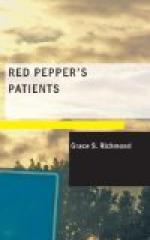* * * * *
Next morning, at the time of Mrs. Burns’s visit to the hospital, King sent Franz to play for Miss Linton. With her breakfast tray had come his second note telling her of this intention, so she had two hours of anticipation—a great thing in the life of a convalescent. With every bronze lock in shining order, with the little wrap of apricot pink silk and lace about her shoulders, with an extra pillow at her back, Miss Anne Linton awaited the coming of the “Court Musician,” as King had called him.
“It’s a very good thing Jord can’t see her at this minute,” observed Burns to his wife as he met her in the hall outside the door. “The prettiest convalescent has less appeal for a doctor than a young woman of less good looks in strapping health—naturally, for he gets quite enough of illness and the signs thereof. But to a lusty chap like King Miss Anne’s present frail appearance would undoubtedly enlist his chivalry. Those are some eyes of hers, eh?”
“I think I have never seen more beautiful eyes,” Ellen agreed heartily.
Her husband laughed. “I have,” he said, and went his way, having no time for morning musicales.
That afternoon Anne Linton, having had all her pillows removed and having obediently lain still and silent for two long hours, was permitted to sit up again and write a note to King to tell him of the joy of the morning:
DEAR MR. KING:
It was as if the twilight were falling, with the stars coming out one by one. By and by they were all shining, and I was on a mountain top somewhere, with the wind blowing softly against my face. It was dark and I was all alone, but I didn’t mind, for I was strong, strong again, and I knew I could run down by and by and be with people. Then a storm came on, and I lifted my face to if and loved it, and when it died away the stars were shining again between the clouds. Somewhere a little bird was singing—I opened my eyes just there, and your Franz was looking at me and smiling, and I smiled back. He seemed so happy to be making me happy—for he was, of course. After a while it was dawn—the loveliest dawn, all flushed with pink and silver, and I couldn’t keep my eyes shut any more for looking at the musician’s face. He is a real musician, you know, and the music he makes comes out of his soul.
When it was all over and he and Mrs. Burns were gone, my tray came in. This is a frightful confession, but I am not a real musician; I merely love good music with some sort of understanding of what it means to those who really care, as Franz does. To me, after all the emotion, my tray looked like a sort of solid rock that I could cling to. And I had a piece of wonderful beefsteak—ah, now you are laughing! Never mind—I’ll show you the two scenes.
Upon the second sheet was something which made Jordan King open his eyes. There were two little drawings—the




